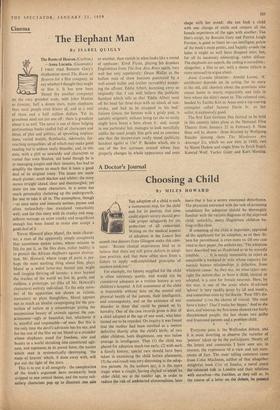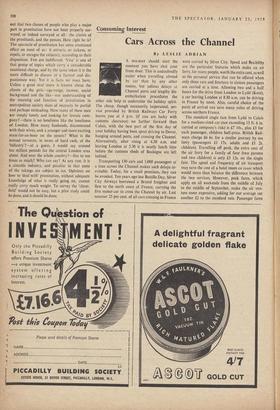A Doctor's Journal
Choosing a Child
By MILES HOWARD
THE adoption of a child is such a momentous step, for the child and for its parents, that (one could argue) society should pro- vide proper safeguards for the protection of all concerned. Writing on the medical aspects of adoption in the Lancet last month two doctors from Glasgow make this com- ment : 'Recent clinical experiences lead us to believe that there are still grave.defects in adop- tion practice, and that these often stem from a failure to apply well-established principles of modern medicine.'
For example, the history supplied for the child is often extremely scanty, and would not be: considered adequate as a routine history at any children's hospital. A full assessment of the child is impossible without data on the mental and physical health of the parents, their intelligence, and consanguinity, and on the existence of any disorder in them that could .be passed on by heredity. One of the case records given is that of a child adopted at the age of one week, whnlater turned out to be retarded. On inquiry it was found that the mother had been certified as a mental defective shortly after the child's birth; of two older children, both illegitimate, one was below average in intelligence. Thus (1) the child was placed for adoption much too early, (2) with such a family history, special care should have been taken in examining the child before placement, (3) the end-result was very distressing to the adop- tive parents. As the authors say, it is the more tragic when a couple, having elected to adopt an older child, say at the toddler age, in order to reduce the risk of undetected abnormalities, later learn that it has a severe emotional disturbance. The physician entrusted with the task of screening candidates for adoption should be thoroughly familiar with the various disguises of the deprived child; unluckily, many illegitimate children be- long to this class.
If screening of the child is important, appraisal of the applicants for its adoption, as to their fit- ness for parenthood, is even more so. Of one case cited in their paper, the authors say, 'The adoption here described was so ill-advised as to be scarcely credible. . , . It is surely reasonable to reject as unsuitable a husband or wife whose capacity for normal human relationships is defective, from whatever cause.' As, they say, we must reject out- right the notion..that to have a child; natural or adopted, is a cure for female neurosis. Here, by the way, is one of the areas where ill-advised 'advice' is very readily given by all and sundry, and sometimes even by the'doctor. 'Poor Jill's dis- contented' (eArts the chorus of voices). 'She must have a baby! That'll make her happy.' And so she does, and 'whereas the first scene showed two fairly discontented people, the last shows two guilty and frustrated parents and a problem child.
Everyone joins it. the Wolfenden debate, and it is most diverting to observe the varieties of 'posture' taken up by the participants. Nearly all the • letters and commmts I have seen are, in essence, the expression 04f a view and not state- ments of fact. The most' telling comment came from Colin. Maclnnes, ainhor of that altogether delightful book City of Spades, a novel about the coloured folk in London and their relations with ourselves—the Jumbles, as they call us. In the course of a letter on the debate, he pointed out that two classes of people who play a major part in prostitution have not been properly sur- veyed, or indeed surveyed at all : the clients of the prostitutes, and the ponces. How right he is! The spectacle of prostitution has some emotional effect on most of us : it attracts, or sickens, or repels, or enrages the citizenry, according to their disposition. Few are indifferent. 'Vice' is one of that group of topics which carry a considerable emotional charge, and by the same token it is the more difficult to discuss in a factual and dis- passionate way. Yet it is facts we must have. Unless a great deal more is known about the clients of the girls—age-range, income, social background and the like—our understanding of the meaning and function of prostitution in metropolitan society must of necessity be partial and perhaps misleading. How many of these men are simply lonely and looking for female com- pany?—there is no loneliness like the loneliness of London. How many husbands, discontented with their wives, seek a younger and more exciting mate-for-an-hour on the streets? What is the annual turnover, in terms of hard cash, of the 'industry'?—at a guess, I would say around ten million pounds for the central London area alone. And over the whole country?—five to ten times as much? Who can say? At any rate, it is a .sizeable industry, and peculiar in that none of the takings are subject to tax. Opinions on how to 'deal with' prostitution, without adequate knowledge of what is really going on, cannot really carry much weight. To survey the 'client- field' would not be easy, but a pilot study could be done, and it should be done.











































 Previous page
Previous page